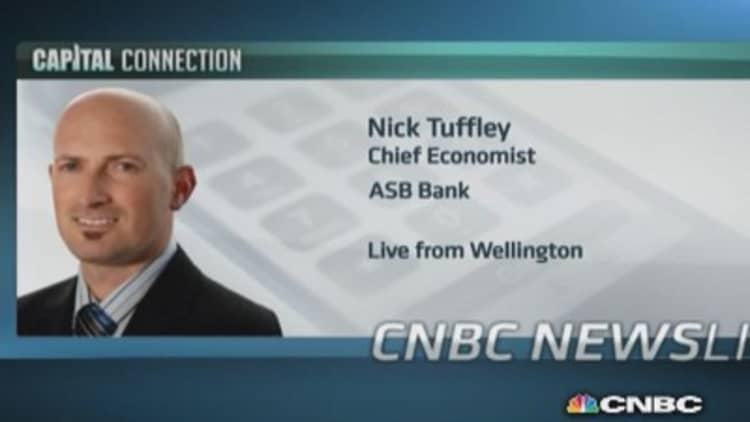As the New Zealand dollar trades within striking distance of its post-float high, the trade that's been on fire since mid-2013 looks unstoppable, analysts told CNBC.
The kiwi was trading around $0.8820 early Thursday, just short of its post float all-time high of $0.8842 hit on August 1 2011, boosted by the move by credit rating agency Fitch to reaffirm the country's AA rating and upgrade its outlook to positive from stable on Tuesday.
"As one of the only two currencies with any appreciable yield in the advanced industrialized universe, the kiwi has been the darling of the yield chasers and the upgrade by Fitch will only serve to reinforce its strength," said Boris Schlossberg, managing director of BK Asset Management.
"The breakout tonight above the key $0.8800 figure puts the highs of $0.8843 from 2011 squarely in view," he added.
Read MoreMilk got your carry trade?
New Zealand raised interest rates three times this year to reach 3.25 percent; it's the only developed economy tightening monetary policy. Many analysts expect a fourth rate hike this month, and the central bank pledged earlier this year to raise rates by 225 basis points over the next two years.
The country's hawkish monetary policy and strong economic fundamentals helped fuel its 14 percent rise against the dollar since mid-last year, while investors' hunger for high yielding currencies also contributed to strength.
Although some analysts flagged the possibility that currency strength could make New Zealand's exports less attractive, most agree that the bank is unlikely to change course on its monetary policy.
Read MoreDollar falls for second week, Kiwi charges higher
"While they expect the currency to come down eventually because of deteriorating terms of trade and falling milk prices etc. they seem unwilling to do much about that in the short term," Callum Henderson, global head of FX Research at Standard Chartered bank, told CNBC.

"It's not stopped their tightening and it doesn't seem to be doing that at least for the time being. The money market is pricing in another 92 basis points of hikes over the next four months," he said. He expects the kiwi to rally to $0.8843, an important technical level, that Henderson said would motivate the currency towards the $0.90 level.
Some analysts don't expect much more upside for the kiwi, however.
Emma Lawson, senior currency strategist at National Australia Bank, sees the New Zealand dollar falling to around $0.80 by year-end.
Read MoreNew Zealand dollar pops in otherwise colorless market
"We don't see it having much further to go. The central bank will be slightly less comfortable with where it [the kiwi] is now, but given that they're on a tightening path they're very unlikely to intervene. What we do expect it to do though, is as it continues to strengthen, the central bank could pull back on the tightening cycle and that will dampen down strength," she said.
Lawson also said much of the strength in the kiwi and Australian dollar comes from the low volatility, yield seeking environment, adding there's little central banks can do about that.
Fitch noted that fiscal consolidation strengthened the resilience of New Zealand's sovereign credit profile, but also noted its vulnerability to high net external debt and commodity dependence.


